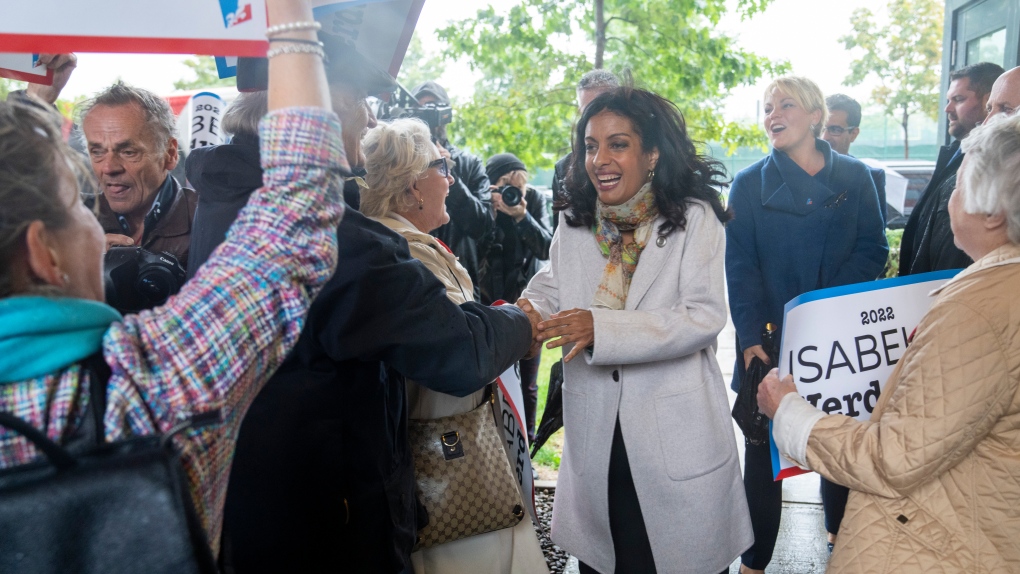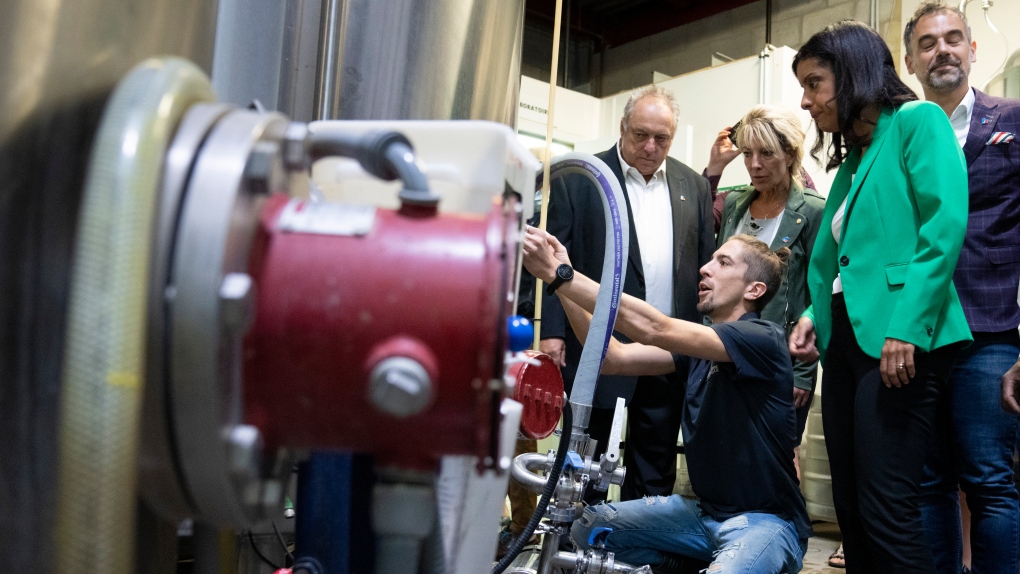'Economy and inclusion': Anglade reflects on Liberal party's identity amid rocky campaign
Four years ago, the Quebec Liberal Party (PLQ) was in power.
Now, the party is sitting at 17 per cent of voting intentions -- over 20 points behind the Coalition Avenir Quebec (CAQ), the same party that ousted the Liberals in 2018.
Despite this, PLQ leader Dominique Anglade is optimistic about Oct. 3.
"On the ground, people are reacting really well," she told CTV News on Monday. "We still have two weeks to go."
In an interview with anchor Maya Johnson, Anglade reflected on the ups and downs of her campaign, on her party's identity, and on the controversial role it played in Quebec language politics.
Watch the full interview in the above video.
A BUMPY CAMPAIGN?
By the time the election campaign started a few weeks ago, the PLQ was short up to 16 candidates, some having withdrawn at the last minute.
When asked about the scramble to find representatives, Anglade directed the focus elsewhere:
"Think about the candidates that we have."
She pointed to Liberal candidates with what she called "impressive feuilles de route" -- roadmaps -- for Quebec's future, such as Jean-Maurice Matte and Vicky-May Hamm.
"There is definitely a vision of Quebec that we need to carry, [a] vision of Quebec that is modern, where everybody is involved, where everybody feels that we're not divided working towards one direction," she said. "So when I look at the candidates that we have, Maya, we can be really proud."
The Liberals eventually found representatives for all of Quebec's 125 ridings, with one exception.
For reasons currently unclear, the candidacy of Harley Lounsbury, who was intended to run in the riding of Matane-Matapédia, was rejected by Quebec's chief electoral officer.
"We're contesting this in front of the court," Anglade confirmed.
As a result, the PLQ is the only major provincial party missing a candidate ahead of voting day.
 Quebec Liberal leader Dominique Anglade greets supporters during a campaign stop in Montreal, on Monday, September 19, 2022. THE CANADIAN PRESS/Paul Chiasson
Quebec Liberal leader Dominique Anglade greets supporters during a campaign stop in Montreal, on Monday, September 19, 2022. THE CANADIAN PRESS/Paul Chiasson
But it's not just the issue of candidacy that has raised eyebrows during the campaign.
A report from La Presse found the party underestimated the net provincial debt by $16 billion.
The error was confirmed by Carlos Leitao, the former Liberal finance minister responsible for the party's costed platform.
But like Leitao, Anglade said the revised figures don't change the party's platform or promises.
"The key message here doesn't change, the main messages we're sending," she said.
"For example, when we think about giving $5,000 per family, when we think about making sure that we have true senior allocation."
AN IDENTITY CRISIS?
With the creation of the CAQ in 2011, not to mention the growing popularity of Eric Duhaime's Conservatives, the PLQ is no longer the only option for voters who don't want Quebec to separate from Canada.
This new reality has prompted questions about the party's role in Quebec's political landscape.
For Anglade, the answer is two-fold.
"The economy is definitely the trademark of the Liberal Party. But I'll say as well, inclusion is a trademark of the Liberal Party."
Her party has promised to put an extra $5,000 in the pockets of Quebecers every year through tax cuts and by freezing hydroelectricity rates.
In addition, the PLQ would increase the immigration threshold to 70,000 a year to help curb the labour shortage.
 Quebec Liberal leader Dominique Anglade tours a microbrewery during a campaign stop in Drummondville, Que., on Tuesday, September 6, 2022. THE CANADIAN PRESS/Paul Chiasson
Quebec Liberal leader Dominique Anglade tours a microbrewery during a campaign stop in Drummondville, Que., on Tuesday, September 6, 2022. THE CANADIAN PRESS/Paul Chiasson
In regards to inclusion, Anglade said she's on a mission to unite Quebec -- the very opposite of what the incumbent premier, in her view, has done.
"Francois Legault has been dividing Quebecers everywhere in the province. Anglophones versus Francophones, immigrant versus non-immigrant. This has got to stop -- we need to unite ourselves, we need to make sure that we unite all Quebecers, 8.6 million of us, and that we work towards one direction."
Anglade's comments should come as no surprise to anyone familiar with her history.
The Liberal leader used to be the CAQ's president but left the party in 2015, citing differing views on immigration and diversity.
She herself is a first-generation Canadian of Haitian descent.
BILL 96 REGRETS?
Historically the party-of-choice for Quebec Anglophones, the PLQ may have severed ties with some voters after it introduced an amendment to language law Bill 96 that would require students in English junior colleges (CEGEPs) to take three "core courses" in French.
READ MORE: Quebec only issuing marriage certificates in French under Bill 96, causing immediate fallout
Faced with a backlash over the proposed amendment, the Liberals later backtracked and proposed that it be withdrawn. After Bill 96 was adopted, Anglade said her party would make changes to the legislation, but not repeal it – and the new rules on French courses in English CEGEPS would stay.
"We can't re-do the past," said Anglade. "But what I can tell you is we voted against Bill 96."
 Quebec Liberal Party Leader Dominique Anglade, centre, speaks during a press conference as Dawson College student union executive members look on at the National Assembly in Quebec City, Wednesday, March 16, 2022. THE CANADIAN PRESS/Pascal Ratthe
Quebec Liberal Party Leader Dominique Anglade, centre, speaks during a press conference as Dawson College student union executive members look on at the National Assembly in Quebec City, Wednesday, March 16, 2022. THE CANADIAN PRESS/Pascal Ratthe
Would she have done things differently by consulting more with CEGEPs, students and parents?
"[We] probably would have had those conversations sooner rather than later."
Anglade also noted that her party also voted against the controversial Bill 21, which bars government employees from wearing religious symbols such as hijabs.
"I sit down, I meet with everybody, and we fix the solution. That's what we did with Bill 96," she concluded. "That's why we voted against Bill 21. And that's exactly where we're going to be standing on Oct. 4 as a Liberal government."
CTVNews.ca Top Stories

Canada expands list of banned firearms to include hundreds of new models and variants
The Canadian government is expanding its list of banned firearms, adding hundreds of additional makes, models and their variants, effective immediately.
LIVE UPDATES Anger, vitriol against health insurers filled social media in the wake of UnitedHealthcare CEO's killing
The masked gunman who stalked and killed UnitedHealthcare CEO Brian Thompson used ammunition emblazoned with the words 'deny,' 'defend' and 'depose,' a law enforcement official said Thursday. Here's the latest.
Man wanted for military desertion turns himself in at Canada-U.S. border
A man wanted for deserting the U.S. military 16 years ago was arrested at the border in Buffalo, N.Y. earlier this week.
Life expectancy in Canada: Up last year, still down compared to pre-pandemic
The average Canadian can expect to live 81.7 years, according to new death data from Statistics Canada. That’s higher than the previous year, but still lower than pre-pandemic levels.
The National Weather Service cancels tsunami warning for the U.S. West Coast after 7.0 earthquake
A 7.0 magnitude earthquake shook a large area of Northern California on Thursday, knocking items of grocery store shelves, sending children scrambling under desks and prompting a brief tsunami warning for 5.3 million people along the U.S. West Coast.
These foods will be hit hardest by inflation in 2025, according to AI modelling
The new year won’t bring a resolution to rising food costs, according to a new report that predicts prices to rise as much as five per cent in 2025.
The world has been warming faster than expected. Scientists now think they know why
Last year was the hottest on record, oceans boiled, glaciers melted at alarming rates, and it left scientists scrambling to understand exactly why.
Pete Davidson, Jason Sudeikis and other former 'SNL' cast members reveal how little they got paid
Live from New York, it’s revelations about paydays on 'Saturday Night Live.'
'At the dawn of a third nuclear age,' senior U.K. commander warns
The head of Britain’s armed forces has warned that the world stands at the cusp of a 'third nuclear age,' defined by multiple simultaneous challenges and weakened safeguards that kept previous threats in check.

































